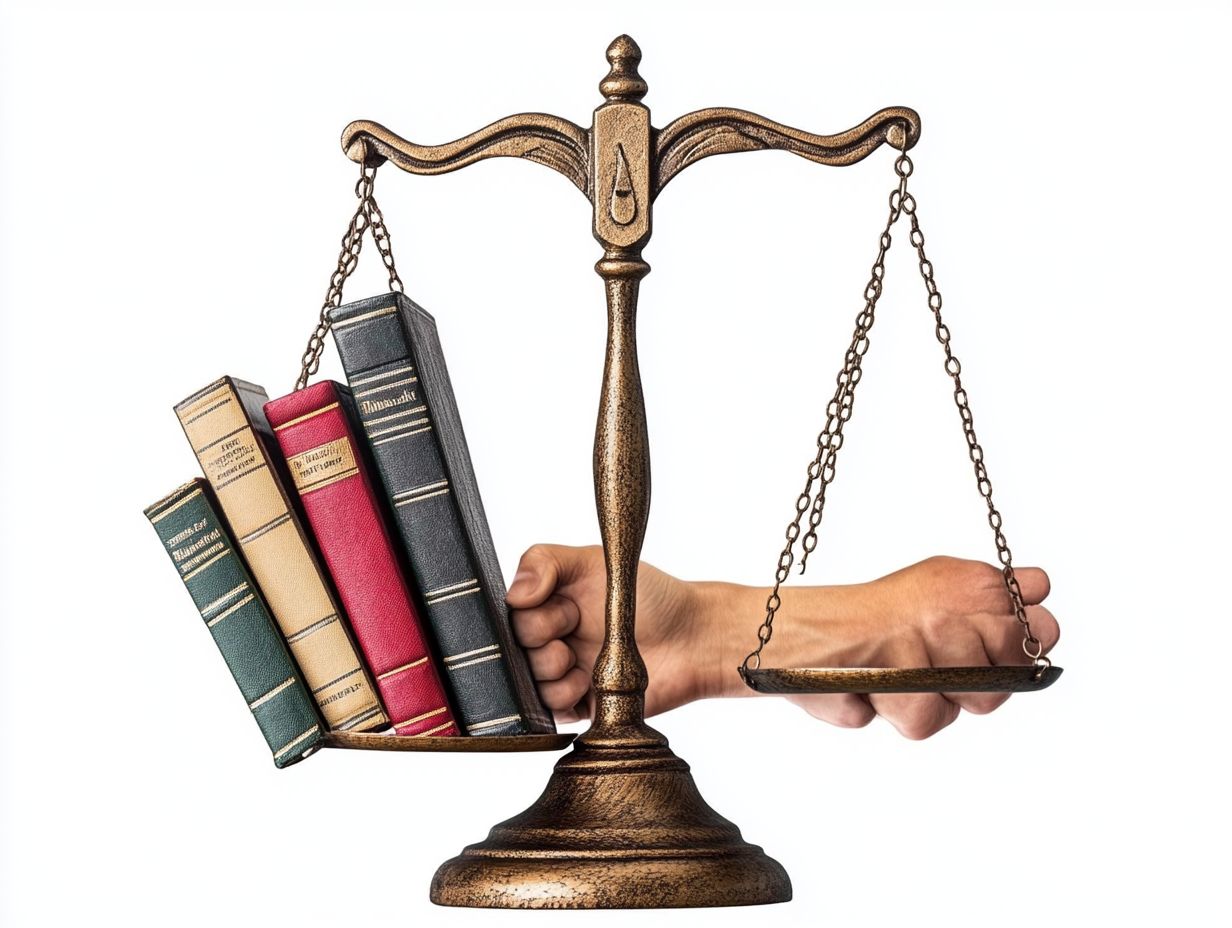IP Litigation vs. Mediation: Pros and Cons
In the complex situation of intellectual property (IP) disputes, choosing the right path to resolution can feel overwhelming. This article breaks down the two primary approaches: IP litigation and mediation. It examines the advantages and disadvantages of each method, helping you grasp the nuances involved.
You ll find key factors to consider as you determine which route is most suitable for your unique circumstances. Whether you are a business owner or an inventor, this guide offers valuable insights to empower you in making informed decisions.
Contents
Key Takeaways:

- IP litigation can be a costly and time-consuming process, but it provides a more binding and enforceable resolution compared to mediation.
- Mediation offers a more collaborative and flexible approach to resolving IP disputes, but it may not result in a legally binding decision.
- When deciding between IP litigation and mediation, consider factors like time, cost, desired outcome, and the complexity of the dispute.
Defining the Two Processes
Mediation and litigation represent two distinct pathways for resolving legal disputes, each with its own unique framework and implications for you as a party involved.
Mediation offers a collaborative approach, where a skilled third-party mediator facilitates negotiations. This often leads to a settlement agreement that keeps discussions confidential and grants you greater control over the proceedings.
In contrast, litigation is the process of taking a dispute to a court and having it decided by a judge or jury. This formal avenue can entail substantial legal expenses and a considerable emotional toll on you and your co-parties.
Pros and Cons of IP Litigation
IP litigation can present several compelling advantages, such as obtaining a formal resolution delivered by a judge or jury.
However, it’s crucial to weigh these benefits against the significant drawbacks. This structured process can yield enforceable verdicts and establish legal precedents, yet it often comes with high legal costs and can stretch out over a considerable period, adding emotional burdens to everyone involved.
Advantages and Disadvantages

- Advantages: Potential for a fair outcome through a structured process and enforceability of court orders.
- Disadvantages: High legal costs and emotional strain on everyone involved.
These structured processes often lead to higher compliance rates, as court judgments hold significant weight. The emotional strain cannot be ignored; anxiety and uncertainty can leave individuals feeling drained, and outcomes may take years to materialize.
While formal litigation can provide clarity, informal options like negotiation or mediation may offer quicker resolutions, though with less enforceable results. This stark contrast emphasizes the need for you to thoughtfully assess your priorities whether you value the stability of a court ruling or the speed of reaching an agreement outside the courtroom.
Pros and Cons of Mediation
Mediation, as an alternative dispute resolution (ADR) process, presents distinct advantages and disadvantages that are vital for you to consider when addressing a legal dispute.
Renowned for its cost-effectiveness and efficiency, mediation enables you to explore creative solutions through collaborative negotiation led by a skilled mediator.
It also keeps your discussions confidential and allows for a greater degree of control over the proceedings, making it a compelling option in conflict resolution.
In conclusion, understanding the pros and cons of both IP litigation and mediation in IP litigation will help you make the best decision for your future. Consulting a legal expert can provide you with personalized advice tailored to your situation.
Advantages and Disadvantages
The advantages of mediation lie in its ability to cultivate a collaborative environment. This yields outcomes that benefit all parties involved.
Its informal nature often raises concerns due to the lack of binding authority. While mediation can help preserve relationships and mitigate the emotional toll typically associated with litigation, it doesn’t always guarantee compliance with settlement agreements.
In many situations, mediation provides a platform for open communication. This leads to increased satisfaction and a genuine sense of being heard.
For example, businesses frequently turn to mediation to resolve conflicts with suppliers or clients. They discover that this flexible approach allows for innovative solutions that formal proceedings might overlook.
However, the non-binding nature of mediation can spark worries about enforceability. If one party decides not to adhere to the agreement, the other may face limited recourse options.
While informal resolutions can create a more congenial atmosphere, they may lack the structured framework necessary for certain disputes. This complicates matters when significant legal rights are at stake.
Factors to Consider When Choosing Between IP Litigation and Mediation

When navigating a legal dispute, deciding between IP litigation and mediation requires thoughtful contemplation of several crucial factors. These can profoundly influence both the outcome and your overall experience.
Key considerations include the specific legal rights at stake, the potential emotional impact, and your preference for a resolution that is both cost-effective and time-efficient. Assessing the merits and drawbacks of each process is essential for making an informed decision.
Key Differences and Considerations
Get to know the key differences now! They are crucial for making the right choice about the most suitable dispute resolution method. IP litigation typically requires formal legal representation, involves complex procedural rules, and culminates in a judge or jury deciding the outcome.
In contrast, mediation focuses on negotiation strategies and promotes a collaborative approach, facilitated by a third-party mediator.
The formal nature of IP litigation means you might encounter lengthy court processes, substantial legal fees, and the unpredictability of public trial outcomes. Mediation tends to be quicker, allowing you to maintain confidentiality and potentially preserve valuable business relationships.
While litigation results in a binding decision imposed by an authority, mediation offers flexible solutions tailored to the unique needs of both parties.
Grasping these distinctions is essential not just for choosing your strategy but also for evaluating potential risks, costs, and the long-term implications for your intellectual property rights.
Frequently Asked Questions
What is IP litigation and mediation?

IP litigation is a legal process where parties in a dispute over intellectual property rights go to court to resolve the issue. On the other hand, mediation is a form of alternative dispute resolution where a neutral third party helps parties come to a mutually beneficial settlement.
What are the pros of IP litigation?
IP litigation allows parties to present their case in front of a judge, resulting in a legally binding decision. It also provides a clear and established process for resolving disputes and protecting IP rights.
What are the cons of IP litigation?
IP litigation can be a lengthy and expensive process. Additionally, it involves a high level of risk, as the outcome is determined by a judge who may not have expertise in the specific field of intellectual property.
What are the pros of mediation?
Mediation gives you control! You can shape the outcome by working together toward a solution. It is also a more cost-effective and timely option compared to litigation.
Ready to resolve your disputes? Consider mediation today!
What are the cons of mediation?
Mediation offers a chance for resolution, but it s important to note that a settlement isn t always guaranteed!
This process also requires strong cooperation and communication between parties. In some cases, this may not be achievable.
Which option is better for resolving IP disputes?
Choosing the best option for resolving disputes over ideas, inventions, or creations depends on the specific situation.
Litigation may be necessary for complex cases that need legal clarification. For simpler disputes, mediation can be a faster and more collaborative choice.
Consult a legal professional for the best advice tailored to your unique circumstances.






